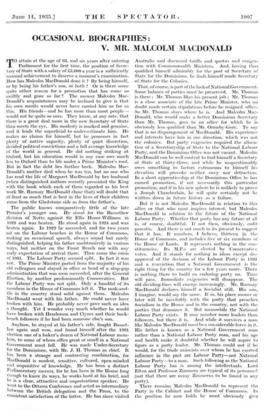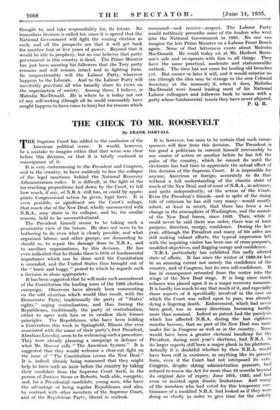OCCASIONAL BIOGRAPHIES : V. MR. MALCOLM MACDONALD
TO attain at the age of 33, and six years after entering Parliament for the first time, the position of Secre- tary of State with a salary of £5,000 a year is a sufficiently unusual achievement to deserve a moment's examination. How has Malcolm MacDonald done it ? By being himself, or by being his father's son, or both ? Or is there some quite other reason for a promotion that has come so swiftly and gone so far ? The answer Malcolm Mac-- Donald's acquaintances may be inclined to give is that his own merits would never have carried him as far as this. His friends—and he has more than most people— would not be quite so sure. They know, at any rate, that there is a great deal more in the new Secretary of State than meets the eye. His modesty is marked and genuine, and it leads the superficial to under-estimate him. He makes no claims for himself, but he possesses in fact plenty of native sagacity, plenty of quiet discretion, decided political convictions and a full average knowledge of the world in general. He did nothing striking at Oxford, but his education would in any case owe much less to Oxford than to life under a Prime Minister's roof. But in fact the debt lies further back. Malcolm Mac- Donald's mother died when he was ten, but no one who has read the life of Margaret MacDonald by her husband (when distinguished, authors recently presented the King with the book which each of them regarded as his best work Mr. Ramsay MacDonald chose that) will doubt that at least as much that is best in the lives of their children came from the Gladstone side as from the father's.
The public knows comparatively little of the late Premier's younger son. He stood for the Bassetlaw division of Notts against Sir Ellis Hume-Williams in 1923 and was beaten. He stood again in 1924 and was beaten again. In 1929 he succeeded, and for two years sat on the Labour benches in the House of Commons, making an occasional speech, always sound but rarely distinguished, helping his father unobtrusively in various ways, but neither on the Front Bench nor with any early expectation of arrival there. Then came the crisis of 1931. The Labour Party seemed split. In fact it was not. The Prime Minister parted from the majority of his old colleagues and stayed in office as head of a stop-gap administration that was soon succeeded, after the General Election, by another predominantly Conservative. But the Labour Party was not split. Only a handful of its members in the House of Commons left it. The rank-and- file in the country stood solid against them. Malcolm MacDonald went with his father. He could never have broken with him. He probably never gave such an idea a thought. Yet I wonder very much whether he would have broken with Henderson and Clones and their back- bench followers if he had been someone else's son.
Anyhow, he stayed at his father's side, fought Basset- law again and won, and found himself after the 1931 election one of a baker's dozen of National Labour mem- bers, to some of whom office great or small in a National Government must fall. He was made Under-Secretary for the Dominions, with Mr. J. H. Thomas as chief. It has been a strange and contrasting combination for MacDonald is modest, sensitive, cultured, open-minded and acquisitive of knowledge. He has been a distinct Parliamentary success, for he has been in the House long enough tb know its ways, he works hard at his brief, and he is a clear, attractive and unpretentious speaker. He went to the Ottawa Conference and acted as intermediary between the British delegation and the "Press, to the consistent satisfaction of the latter. He has since visited Australia and discussed tariffs and quotas and emigra- tion with Commonwealth Ministers. And, having thus qualified himself admirably for the post of Secretary of State for the Dominions, he finds himself made Secretary of State for the Colonies.
That, of course, is part of the luck of National Government. Some balance of parties must be preserved. Mr. Thomas is there ; Mr. Thomas likes his present job ; Mr. Thomas is a close associate of the late Prime Minister, who no doubt made certain stipulations before he resigned office.- So Mr. Thomas stays where he is. And Malcolm Mac- Donald, who would make a better Dominions Secretary than Mr. Thomas, goes to an office for which he is obviously less qualified than Mr. Ormsby-Gore. To say that is no disparagement of MacDonald. His experience and interests have lain in one direction, which was not the colonies. But party exigencies required the alloca- tion of a Secretaryship of State to the National Labour Party, and the Dominions Office was not vacant. Malcolm. MacDonald can be well content to find himself a Secretary of State at thirty-three, and while he unquestionably- owes something to factors extraneous to himself his elevation will provoke neither envy nor detraction. In a short apprenticeship at the Dominions Office he has earned promotion, if not necessarily this particular promotion, and if in his new sphere he is unlikely to prove a Joseph Chamberlain, he will quite certainly not be written down in future history as a failure.
But it is not Malcolm MacDonald in relation to this office or that who most inspires interest, but Malcolm MacDonald in relation to the future of the National Labour Party. Whether that party has any future at all is, of course, doubtful. If not then, obviously, cadit quaestio. And there is not much in its present to suggest that it has. It numbers, I believe, thirteen in the House of Commons, and includes five or six members of the House of Lords. It represents nothing in the con- stituencies. Its M.P.s are elected by Conservative votes. And it stands for nothing in ideas except dis- approval of the decision of the Labour Party in 1931 and a conviction that a National Government is the right thing for the country for a few years more. There is nothing there to build an enduring party on. Time will pass. Immediate exigencies will disappear. The old dividing-lines will emerge increasingly. Mr. Ramsay MacDonald declares himself a Socialist still. His son, I imagine, would say the same. If so, his place sooner or later will be inevitably with the party that preaches Socialism in the House and in the country, not with the parties that denounce it. But meanwhile the National Labour Party exists. It may number more leaders than followers, but there it is. And while it survives a man like Malcolm MacDonald must be a considerable force in it. His father is known as a National Government man rather than a National Labour Party man, and his age and health make it doubtful whether he will aspire to figure as a party leader. Mr. Thomas could not if he would, for the trade unionists over whom he has exerted influence in the past are Labour Party—not National Labour Party—to a man. Such following as the National Labour Party has is among the intellectuals. Lord Elton and Professor Zimmern are typical of its personnel (not that there are many Zimmerns to be found in any party).
There remains Malcolin MacDonald to represent the Party in the Cabinet and the House of Commons. In the position he now holds he must obviously give thought to, and take responsibility for, its future. No immediate decision is called for, since it is agreed that the National Government will fight the coming election as such, and all the prospects are that it will get back for another four or five years of power. Beyond that it would be idle to prophesy, but no one believes that party government in this country is dead. The Prime Minister has just been assuring his followers that the Tory party remains and will remain intact and in fighting form. So unquestionably will the Labour Party, whatever happens to the Liberals. And to the Labour Party will inevitably gravitate all who broadly share its views on the organization of society. Among them, I believe, is Malcolm MacDonald. He is where he is today not out of any self-seeking (though all he could reasonably have sought happens to have come to him) but for reasons which command—and receive—respect. The Labour Party would ruthlessly proscribe some of the leaders who went into the National Government in 1931. --No one can imagine the late Prime Minister on a Labour Front Bench again. None of that bitterness exists about Malcolm MacDonald. He could today sit at Mr. Herbert Morri- son's side and co-operate with him in all things. They have the same practical, moderate and statesmanlike outlook. The time has not come for healing old breaches yet. But sooner or later it will, and it would surprise no one (though the idea may be strange to the new Colonial Secretary at the moment) if, when it does, Malcolm MacDonald were found leading most of his National Labour colleagues and followers back to union with a party whose fundamental tenets they have never abjured.
P. Q. R.



















































 Previous page
Previous page